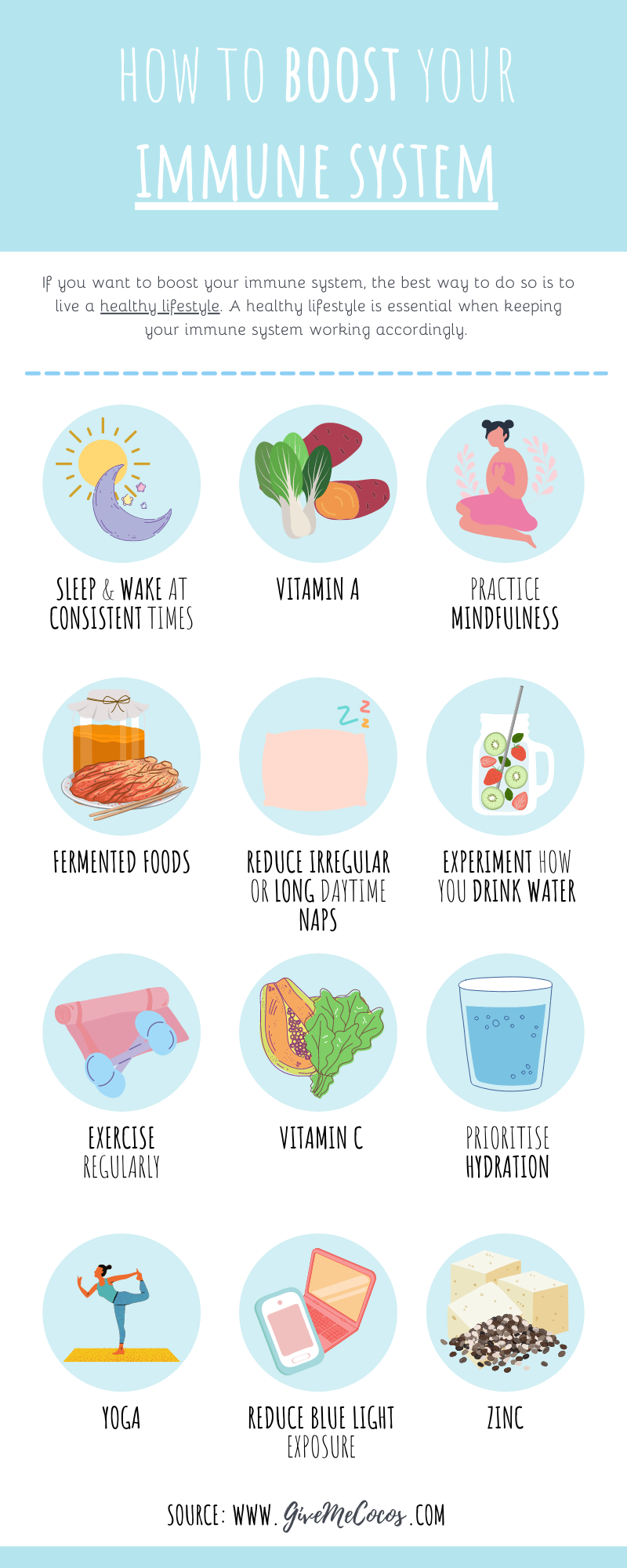Your immune system plays an important role in helping your body fight off illnesses. That’s why it is important to keep your immune system in check, and not only in Winter either when you are more prone to get sick - but all year-round.
If you want to boost your immune system, the best way to do so is to live a healthy lifestyle. A healthy lifestyle is essential when keeping your immune system working accordingly. Not only your immune system will benefit and function better on a healthy lifestyle, but every part of your body will as well.
In order to live a healthy lifestyle (and therefore boost your immune system), your diet plays a role in keeping your immune system in shape to protect you from infections and toxins. A balanced diet includes whole plant foods, healthy fats, vitamins, minerals, fermented foods, and limit added sugars.
Following a healthy, balanced diet will help boost your immune system.
Whole Plant Foods
Fruits, vegetables, seeds, nuts, and legumes are whole plant foods rich in nutrients and antioxidants.
Inflammation is decreased by the antioxidants in these foods by combatting unstable compounds called free radicals (can cause inflammation when they build up in your body in high levels).
Fiber in plant foods feeds your gut microbiome - your immune system can be improved by a robust gut microbiome and your body can be protected from harmful pathogens (organisms that cause diseases) from entering via your digestive tract.
Healthy Fats
Your body’s immune response to pathogens can be boosted, from the intake of healthy fats (such as olive oil and chia seeds which are a source of omega-3s), by decreasing inflammation - chronic inflammation can suppress your immune system.

Foods To Boost Your Immune System
Cauliflower is rich in vitamin C, antioxidants and choline: a nutrient known to keep inflammation in check.
Turmeric
High concentrations of curmin (main active ingredient in turmeric) can help decrease exercise-induced muscle damage, and has promise as an immune booster and an antiviral.
Spinach is rich in vitamin C and contains numerous antioxidants and beta carotene - which both may increase the infection-fighting ability of your immune system. Have spinach cooked as little as possible for it to be in its healthiest form and to retain its nutrients. Though it can be easier to absorb the vitamin A and allow other nutrients to be released from oxalic acid (an antinutrient) when lightly cooked.
The double daily recommended amount of vitamin C can be found in a single medium papaya. It also contains a digestive enzyme called papain that has anti-inflammatory effects, and good amounts of folate, potassium, and magnesium - which are all beneficial to your overall health.

Sunflower seeds are full of nutrients such as vitamins B-6 and vitamin E. Vitamin E is importa
Almost all citrus fruits are high in vitamin C - the production of white blood cells (key to fighting infections) are increased from vitamin C.
Some citrus fruits include:
- Oranges
- Tangerines
- Clementines
- Grapefruit
- Limes
- Lemons
- Broccoli
Broccoli is one of the healthiest vegetables you can eat - as it is full of vitamins A, C, and E, fiber and many other antioxidants.
The best way to eat broccoli is to not cook it at all or as little as possible. If you do want to cook it, try steaming to keep more nutrients in the broccoli.
Ginger is a food that many people go to after they get sick - as it may help with nausea, and have inflammation be decreased, which can then help with inflammatory illness and to reduce a sore throat.
Almonds are packed with vitamin E, which is a powerful antioxidant key to a healthy immune system.
Around 100% of the daily recommended amount of vitamin E for adults can be found in a half-cup serving of almonds (about 46 whole, shelled almonds).
Kiwis are naturally full of essential nutrients such as vitamin C, vitamin K, potassium, and folate.
There are a variety of mushrooms such as maitake, shiitake, and reishi which contain vitamins B, C and D, antioxidants, minerals, and beta-glucans, to support your immune system.
Capsicums are not only a rich source of vitamin C, they’re also a rich source of beta carotene - a red-orange pigment found in plants and fruits that your body converts into vitamin A, helping to keep your skin and eyes healthy.
Garlic
Garlic has a long history of being used as food and as medicine - as it contains unique immune boosting, antioxidant, and antimicrobial properties.
Green tea
Green tea is packed with flavonoids (a type of antioxidant), and has levels of epigallocatechin gallate (EGCG) - a powerful antioxidant. According to studies, EGCG has been shown to enhance immune function. There is also a good source of the amino acid L-theanine in green tea . L-theanine may aid in the production of germ-fighting compounds in your T cells.
Berries such as raspberries, blackberries, and blueberries have antioxidant abilities as they are high in anthocyanins (red and purple pigments found in plants).
Fruits and vegetables are rich in vitamins and minerals that can boost your immune system, and reduce the duration of the common cold.
Vitamins and Minerals To Boost Your Immune System
Vitamin C is important for maintaining a strong immune system. Have 2 servings of fruit (such as oranges, strawberries and papaya), and 5 servings of vegetables (such as spinach, brussel sprouts, kale and bell peppers) to get the adequate amount of vitamin C in your diet.
If you're not getting enough vitamin C, consult with your doctor to see if you need to take a vitamin C supplement.
Vitamin D is one of the most powerful and important nutrients for a strong immune system, as it's known as the sunshine vitamin. Mushrooms and getting sunlight are the best ways for vegans to get vitamin D.
If you can't get enough vitamin D from these sources, talk to your doctor about a vitamin D supplement.
Zinc is essential for the production of new immune system cells.
Food sources that include zinc are:- Tofu
- Whole grains
- Wheat germ
- Legumes
- Sprouted breads
- Seeds
- Nuts
- Miso
To boost absorption - soak legumes, nuts, and seeds overnight, eat fermented food such as miso and tempeh, and eat enough protein.
If you are concerned about your zinc levels or have a deficiency, consider a zinc supplement with your doctor.
Vitamin A is an infection-fighter.
Food sources that contain vitamin A:- Dark green leafy vegetables
- Butternut pumpkin
- Pumpkin
- Sweet potatoes
- Rockmelon
- Carrots
- Vitamin E
Vitamin E can be a powerful antioxidant that helps your body fight off infection. This vitamin is part of nearly 200 biochemical reactions (chemical reactions in living cells that help sustain life and allow cells to grow) in your body, and is critical in how your immune system functions.
Get your vitamin E intake with these high-fat plant foods:
Hazelnuts
Sunflower seeds
Oils such as soybean, sunflower and safflower
Almonds
Peanuts/peanut butter
Folate
Folate helps the body make healthy red blood cells (they carry oxygen from your lungs to all parts of your body). Add more leafy green vegetables, lentils, beans and avocado to your diet in order to increase your folate intake
Iron plays a part in many of the immune system processes, including the transport of oxygen in the blood.
Food sources of iron include:- Green leafy vegetables
- Legumes
- Wholegrains
- Dried fruits
- Tofu
- Selenium
Fermented Foods To Improve Your Health
Made from shredded cabbage that has been fermented by lactic acid bacteria; sauerkraut contains plenty of fiber, vitamin C, vitamin K, and is high in antioxidants that are important for eye health and reduce the risk of eye disease. Choose unpasteurised sauerkraut to get the most health benefits - as the process of pasteurisation kills off beneficial bacteria.
A Korean dish made from fermented vegetables such as cabbage or radishes, it boasts an array of health benefits - such as preventing nutritional deficiencies, aid digestion of protein-heavy meals, ease constipation, and enhance the immune system. It has also been found to be effective when it comes to reducing insulin resistance and lowering cholesterol.
Tempeh is made from fermented soybeans that have been pressed into a compact cake-like form with a rough texture that is firm but chewy. It has a high content of vitamins, fiber, and protein, and can make it easier for your body to break down and digest. Soy protein has been shown to help reduce certain risk factors for heart disease.

A traditional Japanese seasoning, made by fermenting soybeans with salt and koji, a type of fungus. It's been associated with improved heart health and reduced risk of certain cancers, though more human studies are needed. It's most often found in miso soup, but can also be used to spice up salad dressings and glaze cooked vegetables.
A fermented tea that's made from either black or green tea, packed with active enzymes, antioxidants, and amino acids. It can help detoxify the liver, improve digestion, clear up skin, and support overall health.
Non-dairy yogurt such as coconut yogurt is a great source of probiotics.
Limit Added Sugars
Your immune system can be suppressed by added sugars, as they undoubtedly contribute to obesity, heart disease, and type 2 diabetes.
TIP: The best way to enjoy your meals in your balanced diet is in a GiveMeCocos Coconut Bowl , with a Wooden Spoon , Wooden Fork , or Wooden Chopsticks - they are all handmade, eco-friendly, and will make your meals taste better!
Or need a little extra self-love to start your day? Then make a habit to repeat positive statements to yourself first thing in the morning with our Brass Dessert Spoons - these handmade spoons will remind yourself that you are powerful, beautiful, brilliant and brave, while you enjoy your nutritious breakfast. A positive mindset helps with your mental health, which is deeply connected to your immune system.






